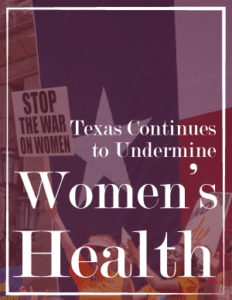 Just when you think that Texas officials could not come up with another way to undermine the reproductive health care of women and the safety net that low-income women rely on, they still find a way. Just recently, the state of Texas applied for a Sec. 1115 waiver in Medicaid for its so-called “Healthy Texas Women” program. The program provides family planning services and supplies to low-income women who would otherwise be ineligible for Medicaid. Texas’ proposed waiver discriminates against specific reproductive health providers and hinders the ability of youth and immigrant communities to receive these services. (See NHeLP’s comments filed with HHS urging it reject the Texas’ waiver project.)
Just when you think that Texas officials could not come up with another way to undermine the reproductive health care of women and the safety net that low-income women rely on, they still find a way. Just recently, the state of Texas applied for a Sec. 1115 waiver in Medicaid for its so-called “Healthy Texas Women” program. The program provides family planning services and supplies to low-income women who would otherwise be ineligible for Medicaid. Texas’ proposed waiver discriminates against specific reproductive health providers and hinders the ability of youth and immigrant communities to receive these services. (See NHeLP’s comments filed with HHS urging it reject the Texas’ waiver project.)
First, Texas’ family planning waiver attacks Planned Parenthood health centers. It excludes providers who perform abortion services, promote these services, or affiliate with providers who do so from receiving funds under this program. This is not the first time that Texas has tried to use an 1115 waiver to end Planned Parenthood’s participation in their Medicaid program. In 2011, the Obama administration rejected Texas’ then proposed family planning waiver for this reason. In turn, the state decided to forego federal funds to implement this policy and created the “Health Texas Women” program. Because of the politics of the current administration, Texas now thinks it has a chance to obtain federal funding for this discriminatory policy.
This proposed provision of Texas’ 1115 waiver violates the “freedom of choice” protections that Medicaid enrollees are entitled to, ensuring that they can receive services from any provider who is qualified to provide them. Not only would women continue to suffer the consequences of Texas’ reproductive health care policies through this waiver but the LGBTQ community in Texas would also be harmed. Planned Parenthood health centers provide culturally competent and affirming care to LGBTQ individuals and is one of the largest providers of health care to transgender individuals in the United States.
Second, the proposed Texas waiver endangers the health and well-being of adolescents. In essence, the waiver would institute parental notification and consent requirements for minors to receive services under this program. A parent or legal guardian would have to apply, renew, and report changes to an adolescent’s case on their behalf if the minor is between the ages of 15 and 17. This provision could harm adolescents who come from vulnerable settings and communities, including those who face abuse by their parents or guardians, and lesbian, gay, bisexual, and queer youth who may experience pregnancy at higher rates than their heterosexual peers. Also, the proposed waiver restricts access to emergency contraception at a time when adolescents in the state already lack resources and education on sexual health. Under the proposed waiver, the Healthy Texas Women program would not cover counseling for or provision of emergency contraception and would not pay for any family planning services that include a diagnosis related to emergency contraception.
Finally, Texas’ proposed waiver harms immigrant communities. According to its application, Texas would disregard federal Medicaid requirements regarding verification of citizenship or immigration status. Under federal law, states must provide applicants who are otherwise eligible for Medicaid with a reasonable opportunity to verify their status. During this period, applicants are able to receive Medicaid benefits. This provision, if implemented, would block access to needed reproductive health care services for immigrant women who already face several barriers to care, including lack of transportation and lack of access to care due to immigration status and immigration enforcement policies.
This waiver would be particularly devastating for women of color in Texas. These women already experience severe health disparities and restricted access to reproductive health services due to political interference. Black women now face the greatest risk for maternal death in the state and Latina women in Texas have higher cervical cancer incidence and mortality rates in comparison to their white peers. Many clinics that closed in Texas due to the passage of House Bill 2 have remained closed.
If this waiver is approved, women with few resources will have to go through several loopholes to access quality, reproductive health care. Unfortunately, Texas is not the only state that is cruelly toying with the reproductive health care of low-income women. South Carolina Governor Henry McMaster has announced his decision to ask for a waiver that would ban abortion providers, including Planned Parenthood health centers, from providing care to Medicaid enrollees.
